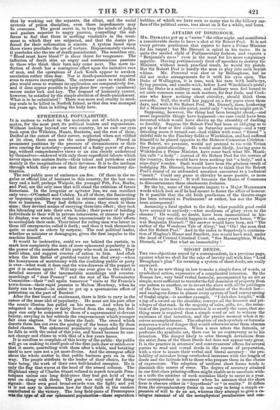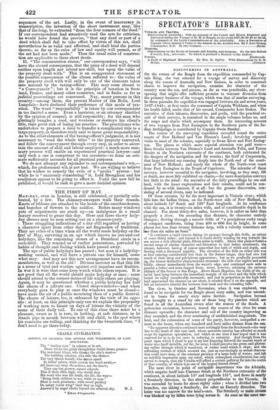SHORT DEEDS.
THE two objections urged by a correspondent, in aprevious page, against what we shall for the sake of brevity call with him "Lord Brougham's plan" for securing a system of short deeds-, are easily answered.
I. It is no new thing in law to make a simple form of words, or symbolical action, expressive of a complicated intention. By the Roman law, very brief verbal formul, accompanied by an act as simple, were sufficient to transfer the full dominion of property from one person to another,- or to invest the slave with all the privileges of the free man. The sasine and infeftment of the Scotch law— and analogous forms in almost every system of land conveyancing of feudal origin—is another example. "I dub thee knight," with a tap of a sword on the shoulder, conveys all the honours and pri- vileges of that rank. In the majority of sales, gifts, &c., the inten- tion of the parties to the transaction is so nearly the same, that no- thing more is required than a simple word or act to witness the existence of that intention, and the precise moment when it re- ceives accomplishment. The adoption of such symbols or formula3 removes a world of danger that would otherwise arise from obscure and imperfect expression. When a man utters the formula, or performs the symbolic act, there can be no controversy as to his intention. The danger likely to arise through deviations from the strict form of the Short Deeds Act does not appear very great. It is the practice in attornies' and conveyancers' offices for several parties to read and reread deeds in the course of preparation, with a view to insure their verbal and literal accuracy : the pro- bability of mistakes being overlooked increases with the length of deeds and the latitude left to those who prepare them in the choice of expressions. The adoption of uniform short forms tends to diminish this source of error. The degree of accuracy attained in our first-class printing-offices might enable us to ascertain with- in a trifle the number of such mistakes likely to occur in a year. Our correspondent is incorrect when he assumes that the short form is obscure either in "hypothesis" or "in reality." It differs from the circumlocutory forms in use only in being a simple ex- pression of will to do an act, whereas they attempt to give a ca- talogue raisonne of all the metaphysical peculiarities and con- sequences of the act. Lastly, in the event of inaccuracy in transcription, the intention of the short instrument may, like that of the long, be extracted "from the four corners of the deed." If our correspondent had attentively read the acts he criticises, he would have found the proviso, "that any deed or part of a deed which shall fail to take effect by virtue of this act, shall nevertheless be as valid and effectual, and shall bind the parties thereto, so far as the rules of law and equity will permit, as if the act had not been made." Thus the usual rules of construc- tion are applicable to these short deeds. II. "The remuneration clause," our correspondent says, "will have the absurd consequence, that the price of a deed will depend neither upon length nor labour nor skill, but upon the value of the property dealt with." This is an exaggerated statement of the possible consequence of the clause referred to : the value of the property dealt with will only be one of the elements taken into account by the taxing-officer. This may seem absurd to "a Conveyancer " ; but it is the principle of taxation in Scot- land, France, and many other countries, and in India as far as judicial proceedings are concerned. Nay, many persons in this country—among them, the present Master of the Rolls, Lord Langdale—have declared their preference of this mode of tax- ation. The word " responsibility " is taken by our correspondent in too limited a sense. Even a barrister, or an attorney shielded by the opinion of counsel, is still responsible; for the man who glaringly bungles a deed, and weakens or destroys his client's title, runs great risk of losing his practice. The practitioner who undertakes to prepare a deed to transfer a complicated title to a large property, is therefore truly said to incur great responsibility. As to the other elements of the taxing-officer's judgment, it is not necessary to "read the whole titles" to the property conveyed, and follow the conveyancer through every step, in order to ascer- tain the amount of skill and labour employed : a much more sum- mary process will enable an experienced practical lawyer—and only such a one is competent to tax accounts—to form an esti- mate sufficiently accurate for all practical purposes.
We do not attempt any rejoinder to our correspondent's wit,— which, for professional wit, is not bad. We are willing to believe that he wishes to remedy the evils of a "prolix" system : but while he is "anxiously considering" it, Lord Brougham and his coadjutors appear to be going to effect it. Until the new bill be published, it would be rash to give a more decided opinion.



















































 Previous page
Previous page